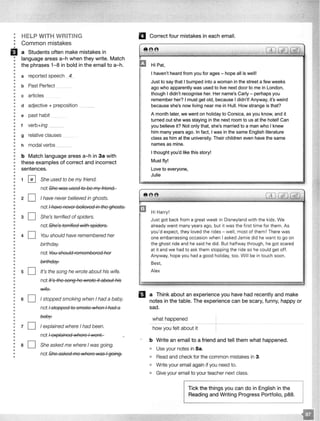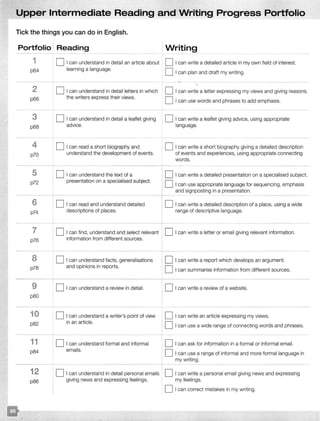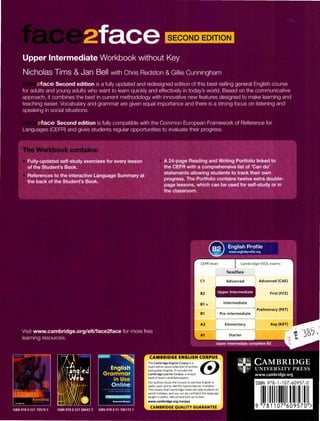This document provides publishing information for an upper intermediate English workbook without key. It was published in 2013 by Cambridge University Press and contains lessons and portfolios covering a range of grammar, vocabulary, reading and writing topics to help learners at an upper intermediate level improve their English language ability. It was written by Nicholas Tims, Jan Bell, Chris Redston and Gillie Cunningham. The document lists ISBN numbers and acknowledges sources of copyright material used within the book.
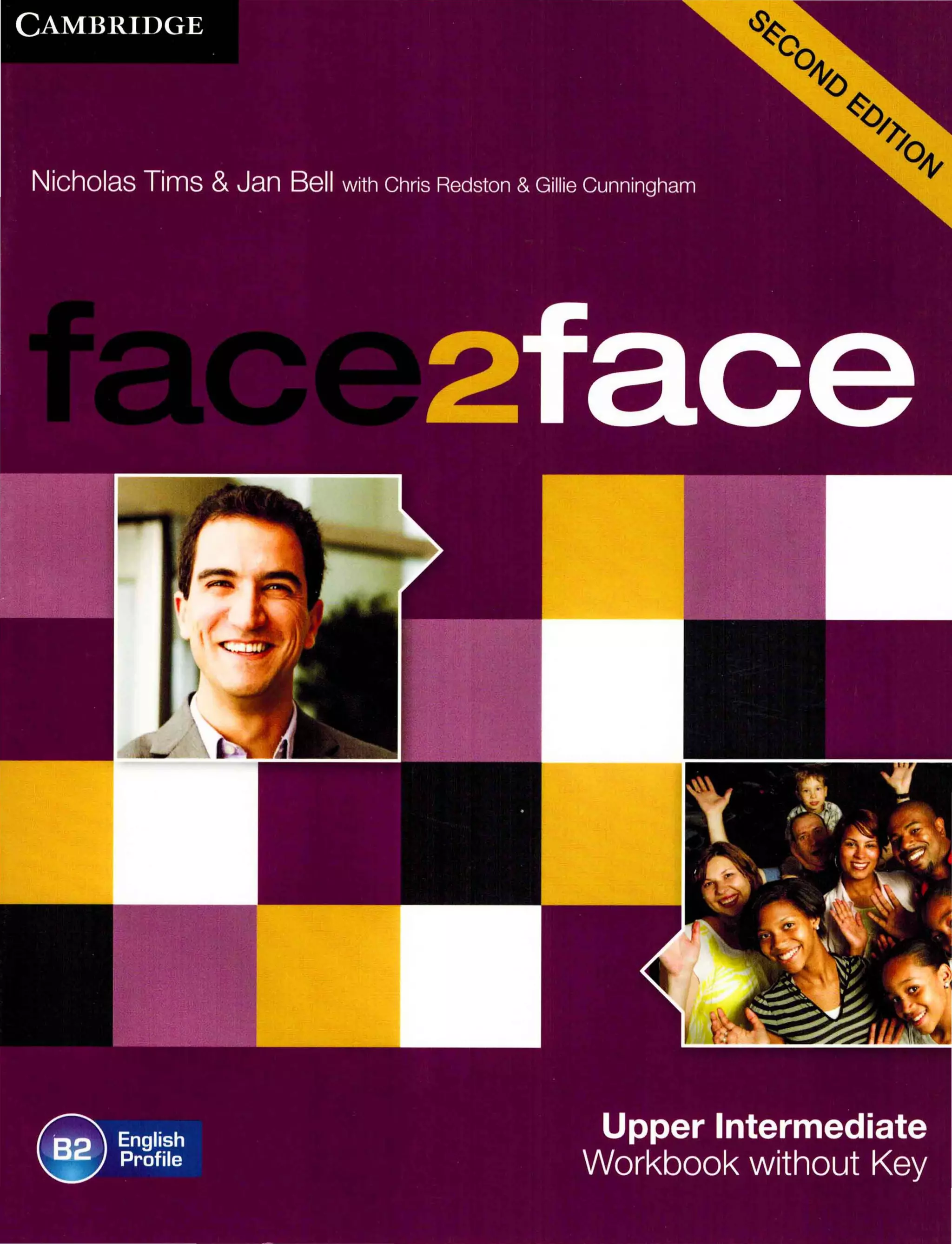
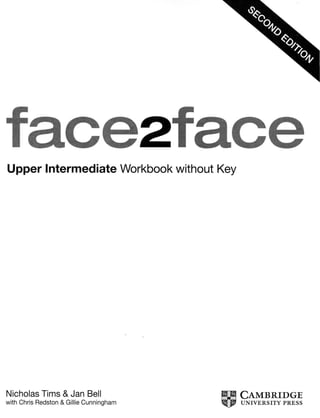
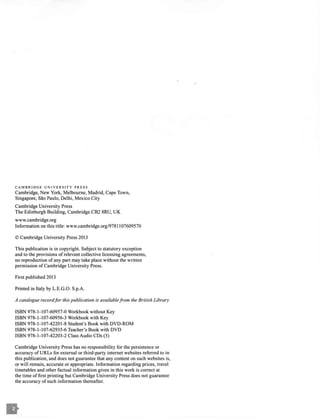
![Contents
Vocabulary Grammar and Real World Re,ading and Writing
Lessons 1A-D p5 Portfolio 1 p64
l'Mltl:l'l!J;tf. Language ability; Education; Planning and draftingIM!:ifttJ;• The English verb system; Auxiliaries in verb forms; Other uses of
Verb patterns (1) auxiliaries Reading an article about learning languages
Keeping aconversation going Writing planning and drafting an article
Lessons 2A-D p10 T Portfolio 2 p66
11lil{!:ll!f.l;tt Expressing frequency; 13;!-!.1,IMJ;• Present and past habits,repeated actions and states; be used to, Letters to anewspaper
Feelings and opinions; Word building (1): get used to Reading two letters to anewspaper
suffixes Discussion language (1): agreeing and disagreeing politely Writing giving emphasis
Lessons 3A-D p15 Portfolio 3 p68
11il{:li!Utf. Crime;Criminals and crime Advice leafletsld;WIW;t Second conditional;alternatives for if, Third conditional
verbs; Crime and punishment; Verbs and l;lf!ult);l!1. Making, refusing and accepting offers Reading apolice leaflet about personal safety
prepositions Writing leaflets: giving advice
Lessons 4A-D p20 Portfolio 4 p70
l'MifMlll·i;tf. Phrasal verbs (1); Books ld;t!'mrn;• Narrative verb forms; Past Perfect Continuous;Defining, Abiography
and reading; Connecting words: reason and non-defining andreduced relative clauses Reading abiography of Johnny Depp
contrast; Ways of exaggerating l;!!:!uli];l!i. Saying you're surprised or not surprised Writing ashort biography: avoiding repetition; adding detail and
personal comment
Lessons 5A-D p25 Portfolio 5 p72
l!J.!it1:!1!Ut• Adjectives (1); Phrasal Preparing a presentationld;tM!W;t Ways of comparing; Future verb forms; Future Continuous
verbs (2); Guessing meaning from context; !l'1'J•h!!•t Discussion language (2):opinions Reading ascience presentation
Adjectives for givingopinions Writing the language of presentations
Lessons 6A-D p30 Portfolio 6 p74
l11!i?J:!ll!j;tf. Phrases with take; Describing a place you loveld;r·WW;• Uses of verb+ing; Modal verbs (1); levelsof certainty about
Compound adjectives describing character; the future Reading adescription of aplace
Back referencing Polite interruptions Writing describing places: reduced relative clauses, strong adjectives
Lessons 7A-D p35 Portfolio 7 p76
l'l•!ij.j:!l!!ja> State verbs; Business and Including relevant informationld;L!M.f.l;• Simple and continuous aspects; activity and state verbs; Present
trade; Word building (2):prefixes; On the Perfect Simple and Present Perfect Continuous Reading aleaflet, an article,an email,notes and afundraising letter
phone Problems on the phone Writing semi-formal letters/emails: including relevant information
Lessons 8A-D p40 Portfolio 8 p78
11Mff.!:llll·U· Dealing with money; ld;WIU!;• Wishes (1): I hope ...; It's time ... ;Wishes (2): should have Reporting facts
Phrasal verbs (3): money; Synonyms l;li·ll'i'M;I!•> Apologising Reading an article reporting on consumer spending
Writing generalising; giving examples
Lessons 9A-D p45 Portfolio 9 p80
l!MdJ:!lltj;> The cinema; Entertainment Website reviewslrl;f.tl,M;• The passive; as. like, such as. so, such
adjectives; Homonyms Iii§!l'iM;l!i. Making and responding to suggestions Reading areview of two websites
Writing reviews: beginning reviews, useful phrases
Lessons10A-D p50 Portfolio 10 p82
l 'MifJ:!ll!Ja> Household jobs;Adjectives Adiscursive articleld;t!.ltM;• have/get something done, get someone to do something,
for views and behaviour;Compound nouns do somethingyourself; Quantifiers Reading an article about combining parenthood and careers
and adjectives l;l!·!l','M;I!•• Adding emphasis Writing adiscursive article:commonconnecting words
Lessons 11A-D p55 Portfolio 11 p84
11MffJ:!l)f.;'1> Workcollocations; Business IMnlM·!;t Describing events;Future Perfect; Reported speech Formal and informal emails
collocations; Verb patterns (2):reporting IM!UM;l!•• Discussion language (3) Reading two emails asking for and giving information
verbs;Advertising Writing making arrangements ininformal and more formal emails
Lessons12A-C p60 Portfolio 12 p86
l'MUllJIM> Colloquial words/phrases; Apersonal emailld;WIM!;t Modal verbs (2): deduction in the present andthepast; Past forms
Vague language expressions; Idioms of modalsand related verbs Reading apersonal email about aghostly experience
Writing apersonal email about an experience:common mistakes
Upper Intermediate Reading and Writing Progress Portfolio p88](https://image.slidesharecdn.com/f2f-iiupper-intworkbookwithkey-171201113951/85/workbook_with_key-4-320.jpg)
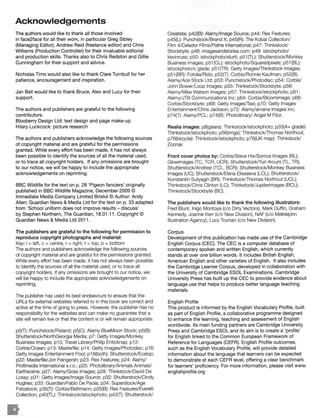
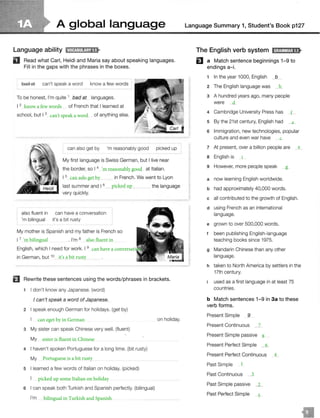
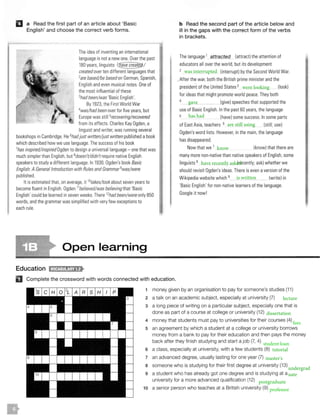
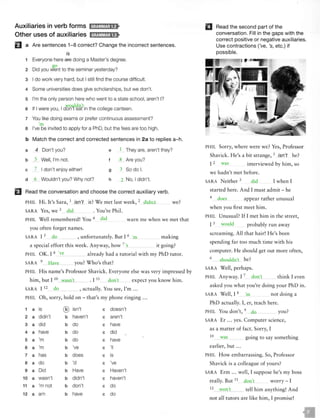
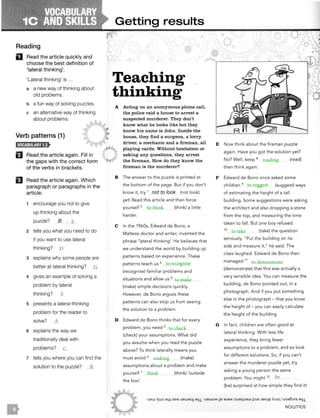
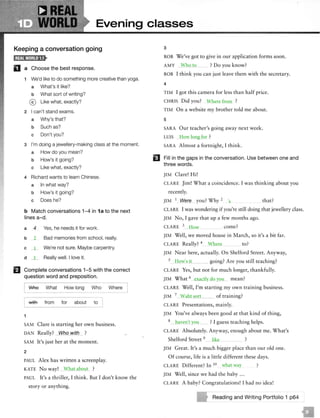
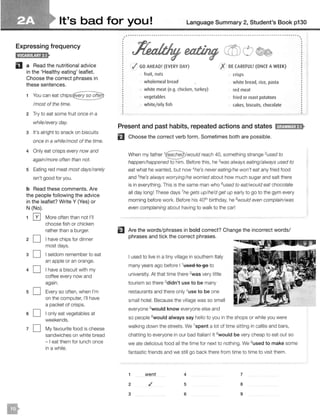
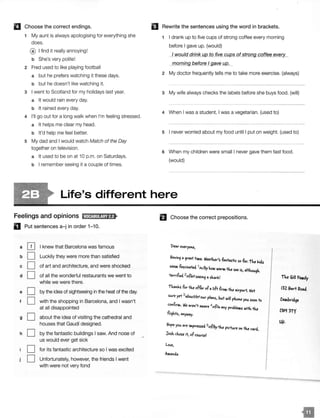
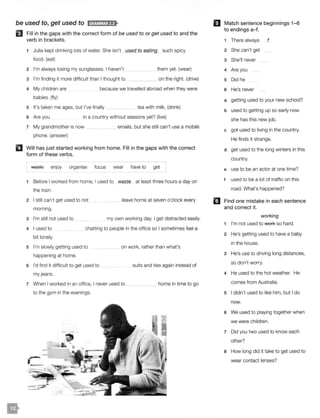
![At a glance
Reading
II Read the article about body language and match
headings 1-4 to paragraphs A-D.
1 It's a small world 3 First impressions
2 Don't jump to
conclusions
4 The rules of attraction
Read the article again and decide whether these
sentences are true (T) or false (F).
1 [£] People don't usually form an opinion of someone
before they've spoken to them.
20 People everywhere nod their head to say 'yes' and
shake their head to say 'no'.
30 It is impossible to smile properly if you don't feel
like it.
40
50
If we are attracted to someone, we often try to copy
what they are doing.
The most universal form of communication is one
we're not usually aware of.
6 0 Body language doesn't always mean what you think
it does.
Word building (1): suffixes 11'tff!1:Il!(jji'fl•
EJ Complete the sentences with the correct form of the
word in brackets. All the words are in bold in the article.
1 I try not to make judgements about people just
because of what they are wearing. (judge)
2 The new job I've been offered will give me a lot more
(responsible)
3 Do you have a _ about where to have the
meeting next week? (prefer)
4 I only have the to do and then the report
will be finished. (conclude)
5 A lot of these expressions
languages. (origin)
from other
6 You should speak with more
them to believe you! (convince)
if you want
7 That's a unusual idea that you just came
up with. (real)
8 What I just said to her wasn't intended as a
of her work. (criticise)
9 Unless you take off that hat, you won't be
at all. (recognition)
THE SIGNS
A Most experts agree
that it only takes
between 90 seconds
and four minutes to
decide what we think
about someone.
And in fact, 80%
of the time, we reach a conclusion about someone
based on body language, before that person has even
opened their mouth! Of course, what you say later will
matter, and this is your responsibility. However, you
do need to get the body language right straight away or
people won't stay around long enough to find out how
fascinating you really are!
B Many gestures, such as how you say 'yes' or 'no',
originate from a specific country, but others are
universal. For example, all people wrinkle their noses
and raise their top lip to show dislike or criticism.
Everyone knows what a smile is, too, and when you're
only pretending to smile. This is because muscles
around the eyes are linked to the emotional part of your
brain, so they only work when you really mean it. Also,
to have any conviction, a smile will fade after a few
seconds. Fake smiles tend to last much longer.
C There are also signals to tell us whether someone is
attracted to us. When someone flirts with you, they
will make eye contact. This preference is shown by
enlarged pupils and they will blink more often. Admirers
will also mirror your behaviour, often unconsciously. So
if you lean forward or take a sip of a drink, you will find
that they will do the same. However, there is another
gesture we are probably unaware of, but which is used
by every culture on Earth and which some experts
claim is the most instantly recognisable non-verbal
human greeting. When we first see someone we find
attractive, our eyebrows rise and fall and if they feel the
same, they raise their eyebrows, too. It's not surprising
if you have never noticed this, since the whole process
only lasts about a fifth of a second!
D However, don't make judgements about people on
just one thing! Look for at least four signals. Sitting with
their arms crossed might look as if someone is being
defensive, but it might really mean they're feeling cold!](https://image.slidesharecdn.com/f2f-iiupper-intworkbookwithkey-171201113951/85/workbook_with_key-14-320.jpg)
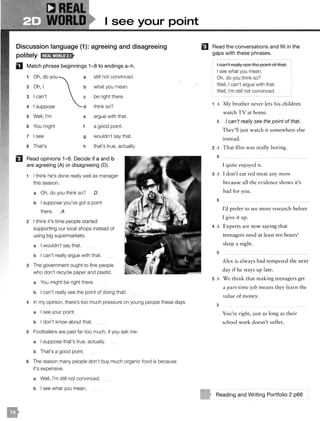
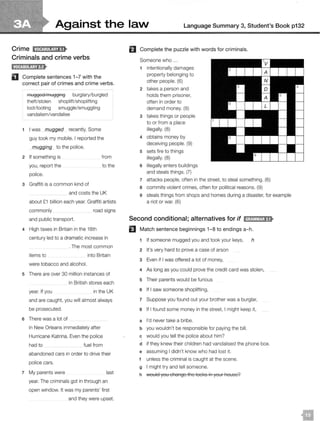
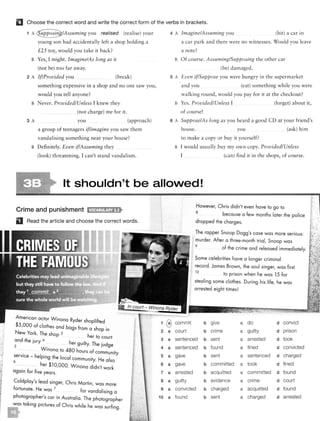
![Third conditional H;t!V.!MJ;lf>
El Choose the correct verb forms.
If I would have offer of a lift, I would have/
had got home safely.
2 Would you have/Had you moved here if you would have/had known about
the crime problem?
3 If he hadl'd had a weapon, I hadn't had/wouldn't have tried to stop him.
4 Suppose they had/had been caught you, did you have to/would you have
had to pay a fine?
5 He would of/could have committed the same crime again if the judge
hadn't sentenced/didn't sentence him to prison.
6 Imagine you didn't have/hadn't had your mobile, what had you/would you
have done?
7 If we wouldn't have/hadn't known about his criminal record, we wouldn't
had/might not have suspected him.
8 How much would have you/you have had to pay, if they would have/had
found you guilty?
EJ a Complete the third conditional sentences with the correct form of
these verbs.
not haye/not arrest not attack/shoot take/not refund
go/find not give/acquit get/not become
1 If we hadn't had any evidence, we wouldn't have arrested him.
2 you the company to court if they
your money?
3 Suppose he her, she him?
4 She to prison for a long time if they her guilty.
5 He away with it if we suspicious.
6 If she evidence, the jury him of the murder.
b Read the sentences in 3a again. Are these sentences true {T) or
false (F)?
1 a [£] The police didn't have any evidence.
b D The police arrested him.
2 a D The company gave the money back.
b D You took the company to court.
3 a D He attacked her.
b D She shot him.
4 a D She went to prison for a long time.
b D She was found guilty.
5 a D He didn't get away with it.
b D We became suspicious.
6 a D She gave evidence.
b D He was found guilty of murder.
II Write sentence chains using the third
conditional.
Rachel wasn't well -+ She took a
day off work -+ She was in bed at
midday -+ She heard her neighbour's
alarm -+ She saw the burglars -+ She
called the police
lf_Rq_cheJ had been_well sh_e_
_wouldn't have taken a dfil' off work.
_If shelJagn't taken_g_c;fgy_ off she
wouldn_J have ...
2 Martin didn't have a job -+ Martin
didn't have any money -+ He stole
some food from a supermarket -+
The security guard called the police
-+ Martin had to go to court -+ He
went to prison -+ He met lots of
criminals -+ He became interested
in crime -+ He trained as a police
officer.
If Martin had had a job,](https://image.slidesharecdn.com/f2f-iiupper-intworkbookwithkey-171201113951/85/workbook_with_key-18-320.jpg)
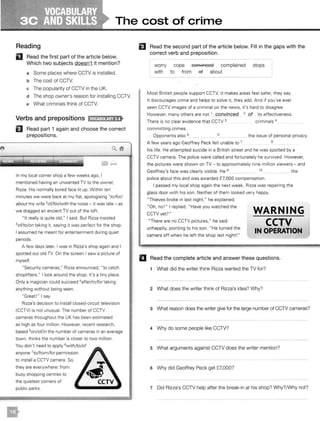
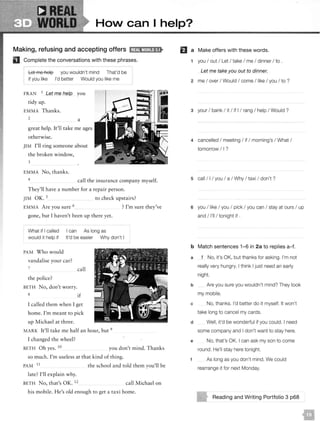
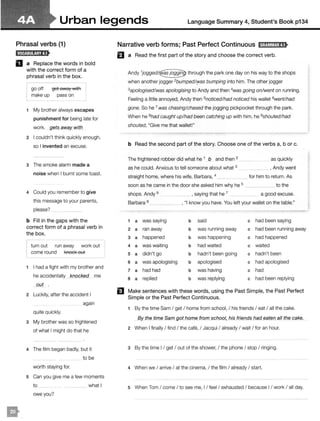
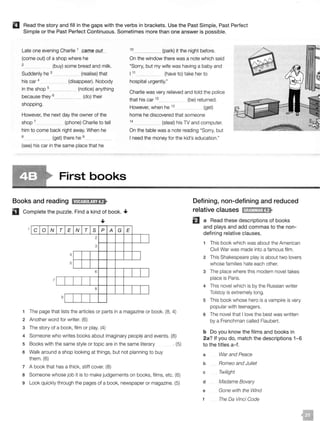
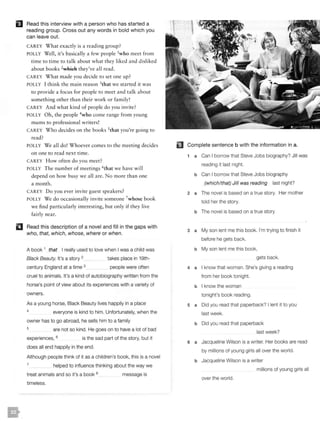
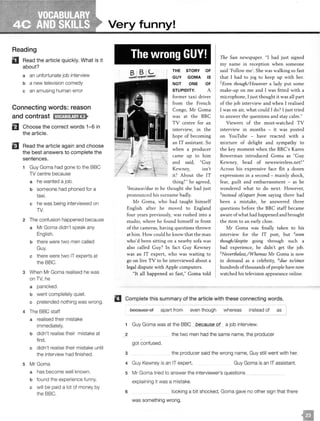
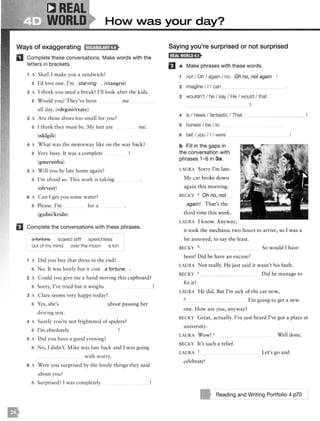
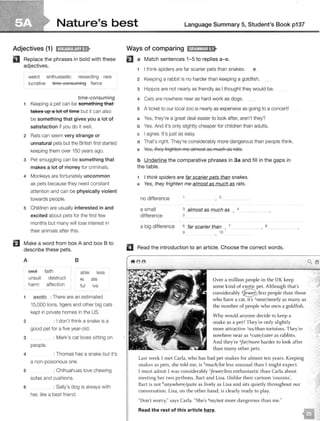
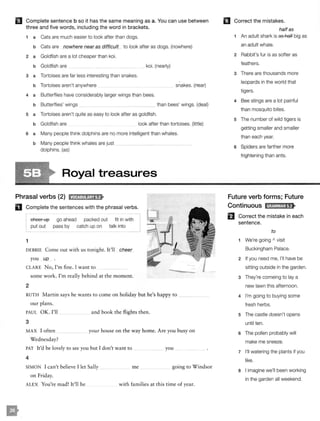
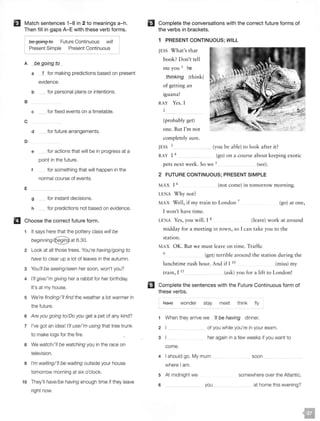
![The nature of cities
Reading
D Read the first two paragraphs. What is
unusual about the River Ebro in Zaragoza?
A Nobody knows how the huge catfish got in
the river.
B There are bird-eating fish that live in the river.
c Pigeons lie in wait to attack the giant fish living
in the river.
fl Read the whole article and decide whether
the following sentences are true (T), false (F)
or the article doesn't say (OS).
2
3
4
5
[I] The threat to pigeons started quite
recently.
D The catfish only ever attacks pigeons.
D The townspeople had first told the writer
about the strange attacks.
D The best time for people to go and watch
the unusual sight is later in the day.
D The best time to see the attacks is while
there is still daylight.
6 D People living in the town tend to
sympathise with the pigeons.
Guessing meaning from context
E a Look at the six words in bold in the article
and put them in these groups.
verbs 1 loiter
2
nouns 3
4
adjectives 5
6
b Match the words in 3a to the meanings
a-f. Look carefully at the context.
a do something slowly, or wait for no
reason
b attack suddenly
c careless
d enormous
e bird
t wait quietly and secretly
Pigeon fanciers
In the Spanish city of Zaragoza, a new menace is threatening the
city's pigeons and it comes from the depths of the River Ebro.
Every day, birds living in the historic buildings there fly down to drink
at the base of a nearby bridge. Some never return.
The reason for their disappearance is the giant wels catfish, a
species native to central and eastern Europe that grows up to three
metres long. The catfish were introduced to the Ebro by German
fishermen in the late 1970s but in the past couple of months the
catfish have begun to lurk in the waters around the bridge. When
pigeons loiter too long at the water's edge, a fish leaps up from
below and swallows one of them whole.
The citizens of Zaragoza, fascinated, gather at the bridge each day
to witness the unlikely battle between fish and fowl. Having heard
about this unusual event in the Spanish media and thinking it was
worth investigating, I decided to join them.
I arrived at the bridge on a chilly afternoon. There were no catfish
in sight, however. No pigeons, no crowds, nothing. But as the day
went on, more and more passers-by paused to take a quick glance
into the depths. I talked to one, named Oscar, who helpfully showed
me the stretch of water where the catfish liked to be.
Not everyone was so well informed. One self-appointed expert
confidently told me that catfish weren't fish at all, because they live
on both land and in water. Another know-it-all explained that they
only fed in the morning. (I found out later that they actually hunt in
the evening and at night.)
Finally, at about 5.30 in the afternoon, a dark shape measuring a
good deal more than a metre took up its place in the water close to
the unwary birds, which were drinking nearby. By now, an audience
had gathered in the hope of a show - and it didn't take long. With a
sudden splash, a catfish made an unsuccessful lunge at a pigeon.
The next bird was not so lucky. For two hours, a crowd of about 50
watched three big catfish feeding.
Most people were taking the side of the fishy invaders. A cheer went
up whenever a catfish made a successful attack. One woman was
on the pigeons' side, however, greeting each narrow escape with a
shout of triumph. "Poor things," she said. "Nobody likes them."](https://image.slidesharecdn.com/f2f-iiupper-intworkbookwithkey-171201113951/85/workbook_with_key-29-320.jpg)
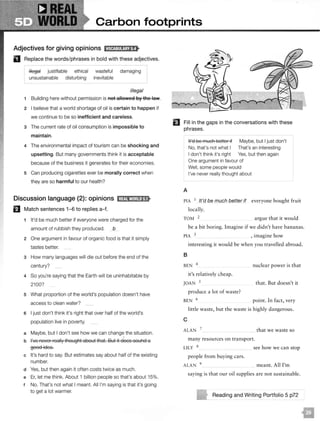
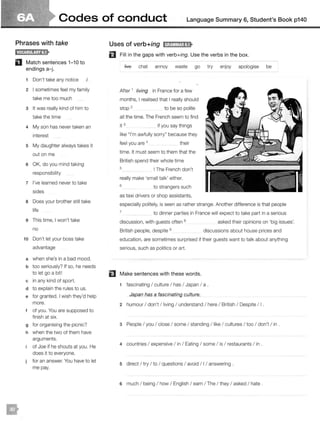
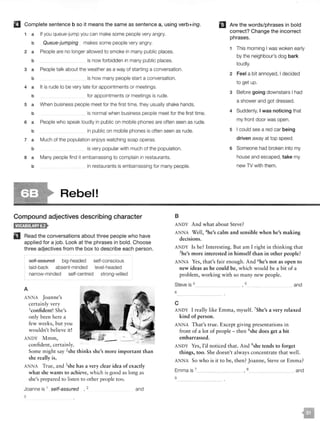
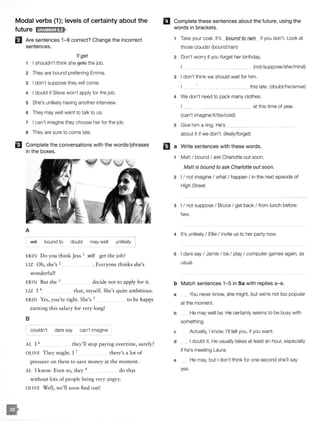
![Dress code
Reading
Read the article about dress codes in UK
schools. Is the answer to the question in the
title yes or no, according to the headmaster?
Back referencing 11MQJ:!ll!j;£1i!<•
fJ Read the article and look at the words in
bold. What do they refer to, a or b?
1 a the school b its students
2 a the dress code b the exam results
3 a at the school b in the countryside
4 a uniforms b beliefs
5 a from Europe b from the UK
government
6 a schools b uniforms
7 a wearing b what students
appropriate clothes wear
8 a the pupils' b the school's
EJ Are the sentences true (T), false (F) or the
article doesn't say (OS)?
1 [£] Anthony Gell school is known for doing
exceptionally well academically.
2 D Headteachers in the UK are not
allowed to go against government
policy on uniforms.
3 D Pupils at schools with a uniform policy
do not necessarily all achieve the
minimum educational requirements.
4 D David Baker abolished uniform at his
school when he became headmaster.
5 D Students at Anthony Gell sometimes
choose to wear clothes which identify
them with that school.
6 D At Anthony Gell, richer children do not
make fun of those with less expensive
clothes.
7 D David Baker rates clothing as less of
a priority than helping pupils to
8 D There are no guidelines about what
to wear at Anthony Gell.
Are uniforms the key to
countryside. Anthony Gell is a small comprehensive, 1which
successfully supports its students and involves the local community.
It also achieves good exam results, but 2
that's not what makes it stand
out. What makes it distinctive is that there is no dress code 3there.
In Europe, school uniforms are relatively rare. Yet the UK
government has had a firm belief in the power of uniforms for years
now, linking 4them to high standards and strict discipline and
advocating zero-tolerance of untidy dress.
Headteachers have found it hard to resist Ssuch pressure. Over
90% of secondary schools are now thought to insist on uniforms and
most of the 6others enforce a strict dress code. However, despite
dressing students in blazers and ties, more than 40 schools still failed
to reach the government's target for basic subjects, and an eight-year
research project in the US recently concluded that uniforms do not
make schools perform better.
When he became head of Anthony Gell, a non-uniform school,
David Baker was aware of how this issue divided people - even the
students themselves. But after doing an extensive survey, he decided
not to change. "As long as students come in appropriate clothes, 7this
isn't an issue. I believe in treating children as individuals, with rights
and responsibilities."
Supporters of uniforms insist they improve behaviour and
community spirit. Yet recent inspections of Anthony Gell commented
on how responsible the pupils appeared and on their obvious pride in
and loyalty towards the school.
Interestingly, proof of Anthony Gell's good relations with its pupils
is revealed by 8their willingness to buy its optional branded clothing.
Students are frequently seen wearing hoodies and sweatshirts
adorned with the school logo around town at the weekend.
Another claim made for uniforms is that they paper over divides
between rich and poor children, making bullying less likely. But
Baker maintains that this is not a problem specific to schools and that
wearing a uniform doesn't solve it. The dress code at his school is
simple: "3Cs - clean, comfortable and covered up." And the absence of
a school uniform liberates him from the obligation to enforce it, thus
allowing more time to focus on the important business of teaching
and learning.](https://image.slidesharecdn.com/f2f-iiupper-intworkbookwithkey-171201113951/85/workbook_with_key-34-320.jpg)
![DREAL
WORLD Sorry to interrupt ...
Polite interruptions l;lif!1fw1;!!1l•!t
D Find one mistake in each sentence and correct it.
1 Is this good time?
Is this a good time?
2 Sorry to disturbing you.
3 Can I have word?
4 Sorry bother you, but have you got a minute?
s I was wondering if could I see you for a moment.
EJ Complete the conversations using the sentences in
1 and the words in brackets.
1
LUCY Hi, love. 1 /s this a good time?
BEN Hi. It isn't, I'm afraid. (against I really I the I
up I I'm I moment I at I it) 2
LUCY That's OK, I'll catch you later.
BEN See you!
2
DAN Hi, Paul. 3
PAUL Sorry, mate, you can't. (tied I just I I'm I bit I
up I now I a) 4
DAN Don't worry. It can wait.
PAUL Cheers.
3
JUA Hello. 5
SARA I haven't just now, I'm afraid. (time I Sorry, I a I this I
good I isn't) 6
JUA pon't worry. Some other time?
SARA Yes, of course. Shall we try later on today? Around 5?
4
SUE Hello. 7
CLA RE That's fine. But (pushed I at I I'm I the I for I time I
moment I rather) 8
SUE It's not important. I'll come back later.
CLARE Great. See you then.
5
SIMON Excuse me, 9
KAY I w ish I had the time, Simon. But (busy I really I I'm I
rather) 10
SIMON When would be more convenient?
KAY Let me just have a look in my diary.
Review: future verb forms
EJ Read the conversation and choose the correct verb forms.
INA Hi, James, sorry to disturb you at work.
JAMES It's no problem. Are you OK?
N INA I'm fine. I was just thinking about this evening. Do you
know what time the film 1€]}>/will start?
JAMES l'm fa irly sure it's 7.30.
N INA I thought so. 2
Are you going to/Do you meet us for a
drink first or not?
JAMES Probably not. I think 3I'll be working/I work late
again, so 4 I'll probably meet/I'm probably meeting you
there as usual.
N INA Right. Amanda 5is coming/will come, too, by the way.
I invited her this morning.
JAMES Good. 6I'm going to/I'll give you both a lift home, if
you like.
I A T hat's brilliant, because the last train 7
will go/goes at
ten and that means we 8won't have to/aren't having to rush
to catch it.
JAMES OK. See you later.
NINA Bye.
Reading and Writing Portfolio 6 p74](https://image.slidesharecdn.com/f2f-iiupper-intworkbookwithkey-171201113951/85/workbook_with_key-35-320.jpg)
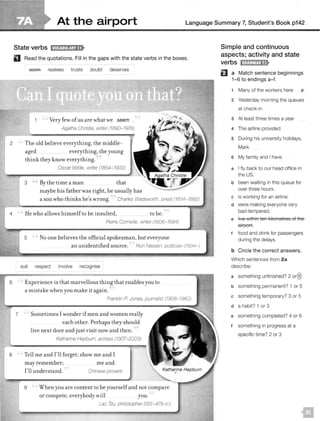
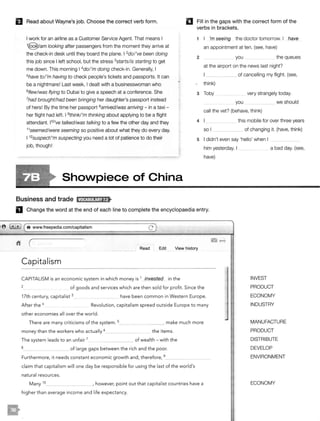
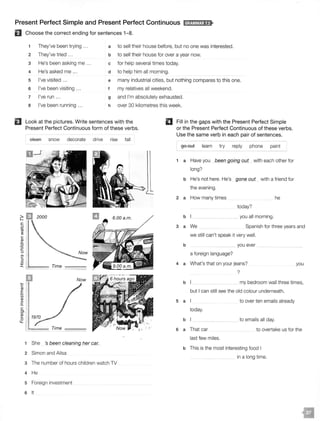
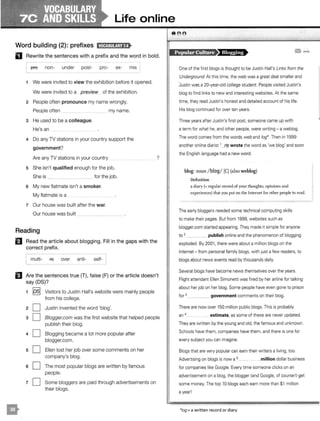
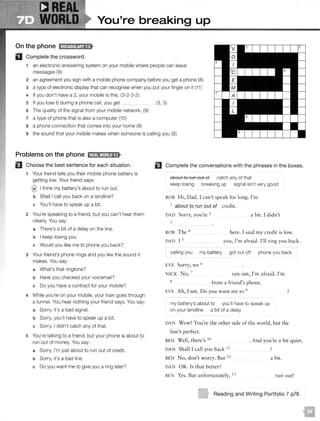
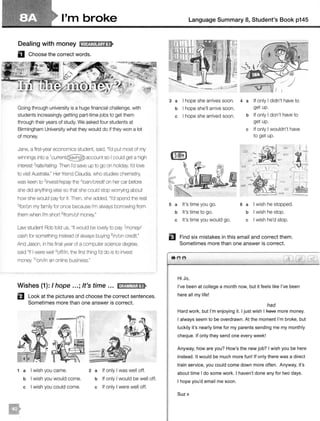
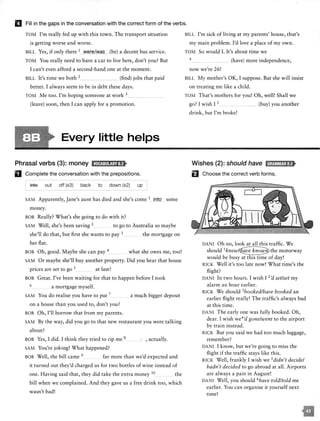
![f] Complete the article about past regrets with
the correct form of the verbs in the boxes.
Things I regret
Wendy Miller, actress
fla>ve give up
not listen know wait
I was an only child and I
always wished I 1 'd had
a sister or brother to play
with. My parents bought me
a puppy instead, but it wasn't
the same! T hen soon after
I left dram a school I married my husband. I wish
I 2 a bit longer - he was a ski
instructor, 20 years older than me, and I should
3 it wasn't going to work out.
Actually, I should never 4 singing and
dancing, either. I used to love appearing in musicals
at drama school, but my tutor encouraged me to do
more serious acting instead, so I joined the Royal
Shakespeare Company. I do enjoy it, but thinking
back, I wish I 5 to her and just
followed my own instinct . But we all make mistakes!
Bill Flack, businessman
work spend become
take learn
Looking back, I definitely
wish I 6
harder at science at school,
because, although I like
my job, I should really
7 a vet.
Animals are my passion. I also wish I
8 to play the saxophone at school.
I'd love to have been in a jazz band. I should also
9 a year off before university to
t ravel abroad, because I think that's a really valuable
experience that I missed out on. But more than
anything, I wish I IO more time with
my children when they were young, because they grow
up so fast .
II a Match the beginnings of sentences 1-6 to endings a-f.
I wish I'd c
2 I wish I
3 It's time you
4 Don't you wish you
5 They shouldn't
6 Shouldn't he
a EJid about finding a job.
b have offered to pay back the deposit he borrowed from
Amanda?
c known you were broke.
d had paid off your loan straight away?
e didn't have to work.
f have taken out such a huge mortgage.
b Match these sentences to 1- 6 in 4a.
a
b
c
d
e
f
They can't afford to pay it.
You've been living off your parents long enough.
I'd have lent you some money.
I'm sure she would like it back.
You must be paying so much interest on it.
I'd love to retire early.
Write sentences about the pictures.
D
1 I wish I I learn I to dance
2 You shouldn't I park I here
3 I wish I I not buy I so much
4 I should I look I at the weather forecast](https://image.slidesharecdn.com/f2f-iiupper-intworkbookwithkey-171201113951/85/workbook_with_key-43-320.jpg)
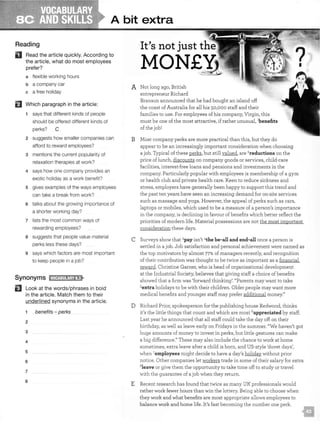
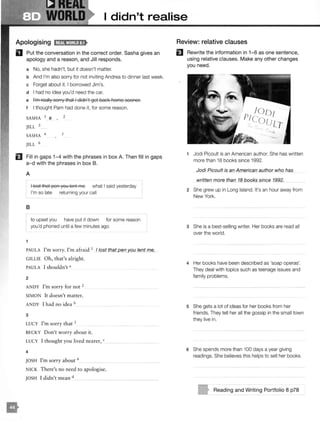
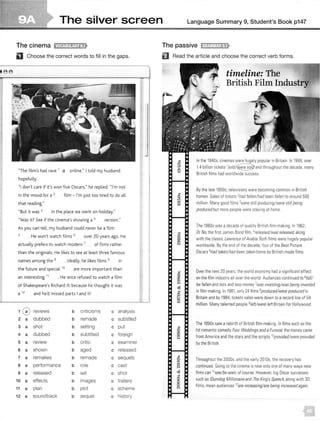
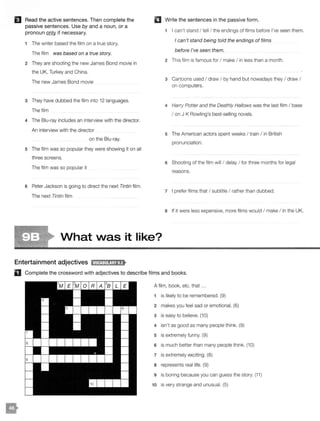
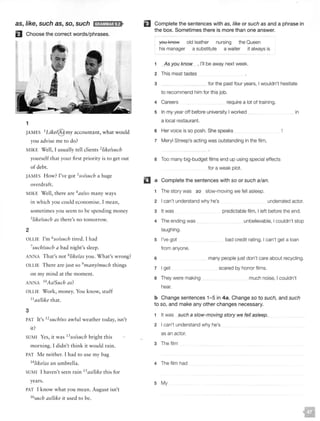
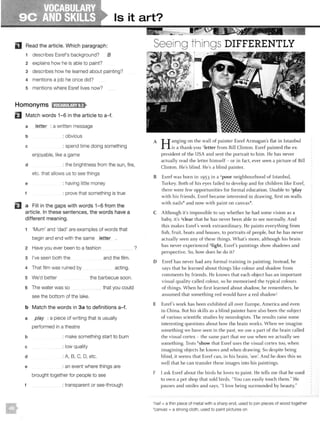
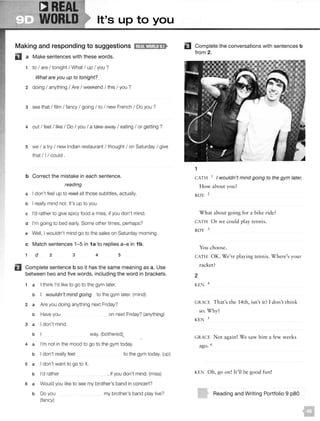
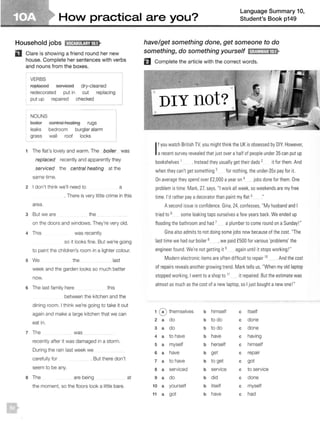
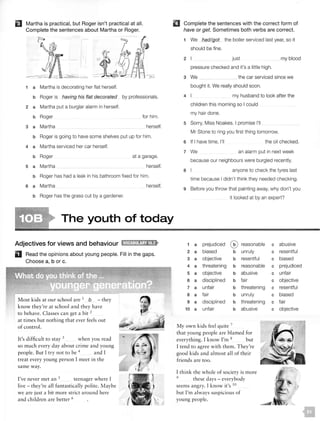
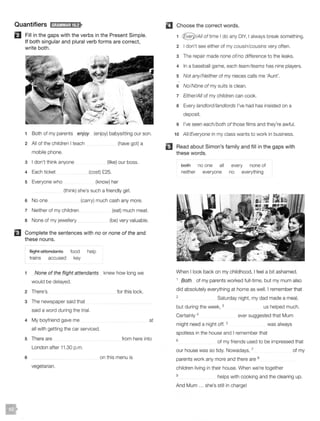
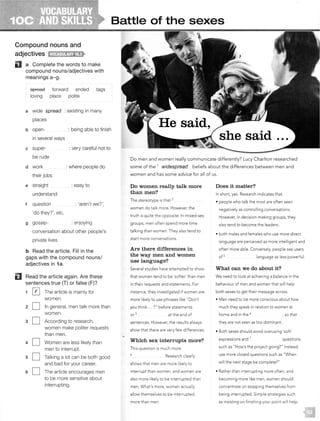
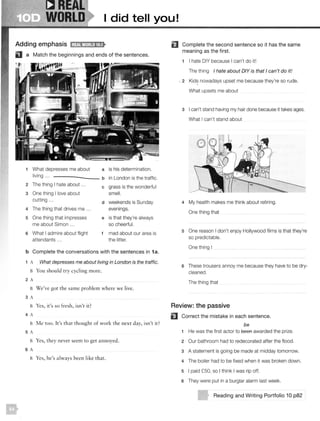
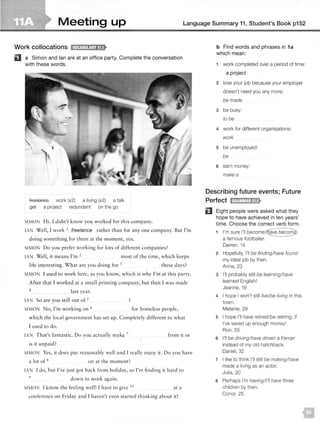
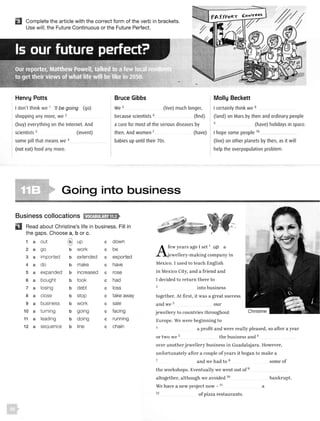
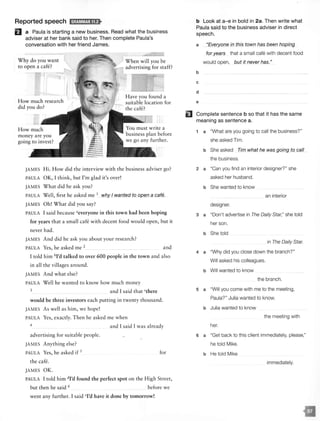
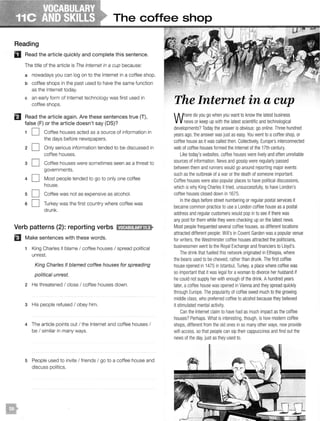
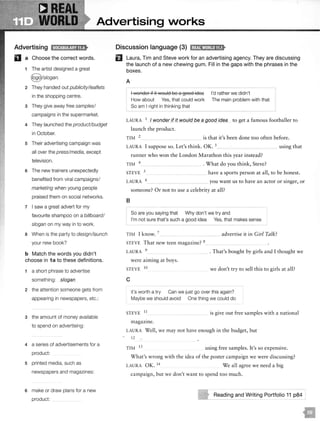
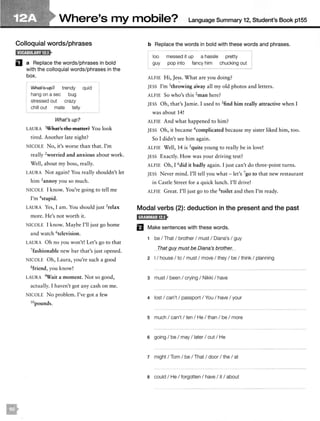
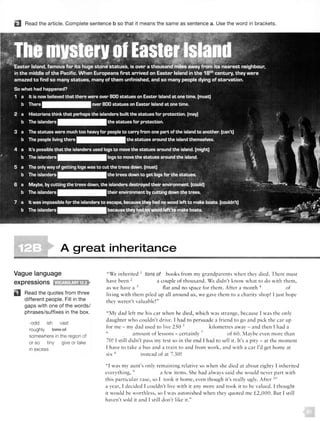
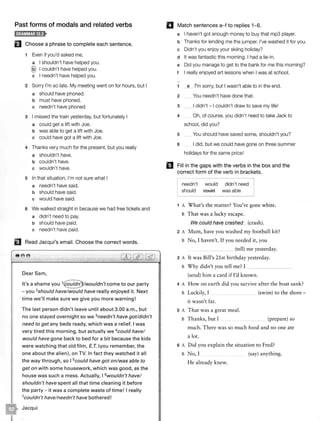
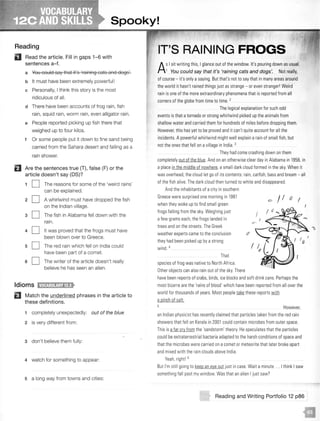
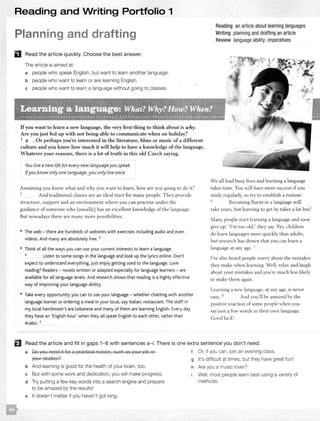
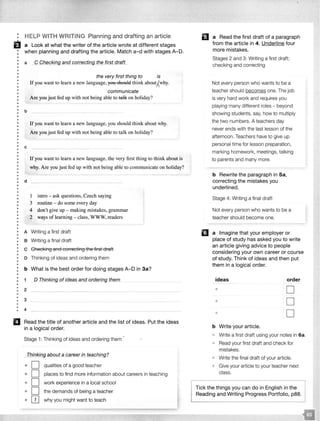
![Reading and Writing Portfolio 2
Letters to a newspaper
D Read both letters quickly. Which statement do they both agree with?
a Schools don't spend enough time teaching speaking and listening.
b Parents don't spend enough time talking and listening to their children.
c Children are more interested in technology than reading and
Why isn't more being done to deal with the problem of
'screen bingeing', which we feel strongly is the real cause of
so much illiteracy among kids? .
In our research, we found a new generation of children
who are spending an average of 7.5 hours a day in of
the computer or TV. More and more often, they are doing
this alone in their bedrooms or on a portable even
if they're among people, they're only paying attention to
their laptop. ln many homes the family unit has
broken down, with kids having no basic communication
skills at all. This is obviously having a big impact on how
they learn to read and write.
It's time we stopped blaming the school system
looked again at how we are bringing up our kids. Having a
l
. wi'th them from time to time would help! Andconversa ion ,
it is also time for the government to take the issue of screen
bingeing' very seriously indeed. Poor is only one of
the many problems caused by kids spending far too much
time in front of the TV or computer screen.
There is a place for modern media, but like a lot of good
things in life, we need a healthy balance.
TERESA ORANGE
LOUISE O'FLYNN
Authors
The Media Diet for Kids
London SW6
B Read the letters again. Are these statements true (T) or false (F)?
In Letter A, the writers:
1 IT] feel that most children spend too long in front of a screen.
Reading two letters to anewspaper
Writing giving emphasis
Review habits in the present and past;
comparative forms
A lot of people seem to blame absolutely everything that
goes wrong on the media, as Teresa Orange and Louise
O'Flynn do (Letters, 3rd March). And yet a huge amount
of our school homework requires us to use the Internet
for research. We learn a lot from television, and you can
too, if you are selective. Computer games are supposed
to be good for developing your brain. And some of my
best discussions with friends have been about computer
games or television programmes.
If parents want children to improve their
communication ski lls, perhaps they should communicate
more themselves! My own parents are so busy these days
that more often than not we don't even eat together as a
fami ly - we just eat fast food in front of the TV, often in
separate rooms. Not much chance of a conversation there!
Another reason why so many younger people don't
communicate very well is perhaps because schools don't
attach enough importance to speaking and listening.
From a very early age, probably because of exam
pressure, kids are made to focus on reading and writing.
Time does move on and technology isn't going to
just go away. Perhaps parents and schools should move
on too, and appreciate modern med ia, while at the same
time finding the time to have proper conversations with
their children!
SALLY PORTER (16)
Birmingham
2 D think that a lot of parents and children no longer talk to each other.
3 D believe that schools should be responsible for teaching children to communicate.
4 D would like to ban computers and television.
In Letter B, the writer:
5 D believes that children get a lot of benefit from the media.
6 0 partly blames TV for the lack of conversation at home.
7 0 thinks that schools don't spend enough time on reading and writing.
a D points out that adults should learn to accept new technology.](https://image.slidesharecdn.com/f2f-iiupper-intworkbookwithkey-171201113951/85/workbook_with_key-67-320.jpg)
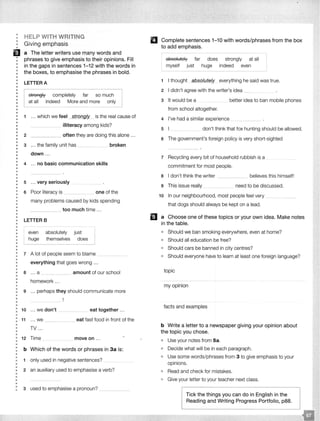
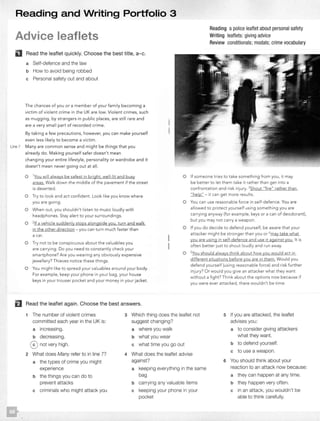
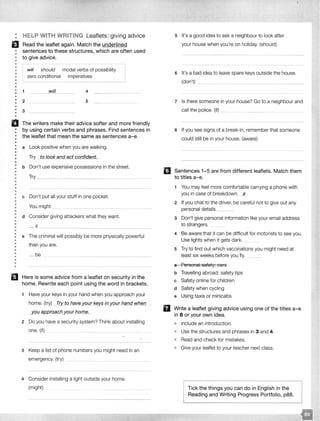
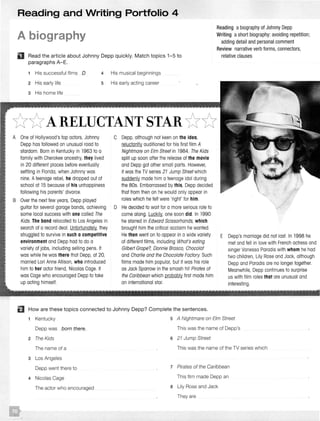
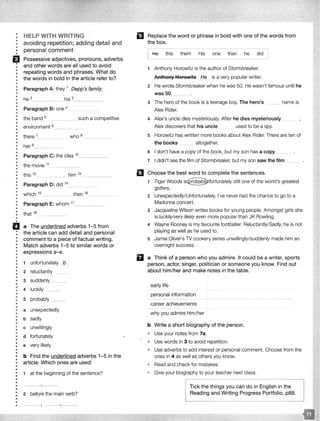
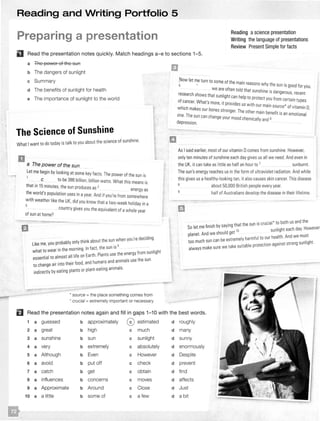
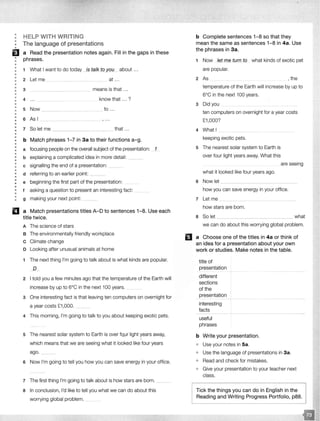
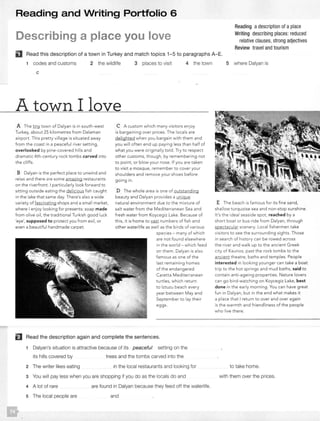
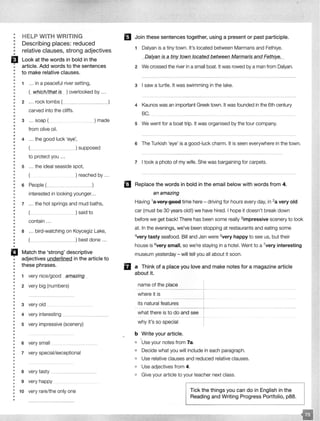
![Reading and Writing Portfolio 7
Including relevant information
Reading a leaflet, an article, an email,
notes and afundraising letter
Writing semi-formal letters/emails:
including relevant information
Review verb formsII Read A-D. Write the missing information 1-10 in email E.
l
o
0
CHARITY CYCLE RIDE CJ0
I
. .?;) Come and from Land's
_ End to John 0 Groats for
J ·····! J the charity of your choice.
{ During March and April wey; ( .. • ,
' ... will be groups
.J,_")> N ..,. .. to make the incredible
1,400-kilometre journey
-:;_· from the south-west
!
----ii..Y:' J
. "'":'.'.,... _:;;
corner of England to
the north-west tip of
Scotland. If you're
8 66
m From: IFour Walls fundraising [funds@fourwalls.org]
To: IHuw Price [hprice@mailme.com]
Subject: IYour charity cycle ride
Attachment: d? Fourwallsprofile.pdf
Dear Huw,
Thank you for your email about your cycle ride. I am happy
to attach some background information on the charity.
We wish you good luck on 2nd April!
Yours sincerely,
Anya Noakes
Publicity Department
- LUUJ"e Mme cm 2nd Ap-rU,
LMUi's £rut
- HfJW Lortj?Lm tfuu.t tm
- New bi!Ge?
- Set- up Uo3 d luuv-tejo3.u;m
- Write Letters - ad<_ for £ 1O?
m
plans for Four Walls?
THE CHARITY Four Walls' target this year is an
ambitious one: £20 million. That's a 33% increase over
Dear Thomas,
On 1 2nd April I will be beginning my 2 kilometre
cycle ride from 3 to John O'Groats in support of
Four Walls, the charity for homeless children in Britain.
Over one million children live in bad housing in Britain. That's I
enough to fill the cities of Edinburgh, Bath and Manchester. These
children are living in damp, cold and infested flats and houses often
poorly maintained by landlords. Or they are homeless, waiting in
emergency housing for a permanent home.
Four Walls was only set up in 4 , but with the
5 raised last year, Four Walls helped 14,312 children
to get back into a home. In the year ahead, Four Walls is aiming at
increasing that total by 6
, to 7
I am asking each person who gets this letter to sponsor me for my
ride. If you can help by giving 8 , that would be less
than 1p per kilometre that I cycle! But if you can't afford that, any
amount would be welcome.
Thanks so much for reading this email. It means a lot to me and
much more to the children who Four Walls helps every year. Do
send me an email at 9 if you'd like more information
about my ride or Four Walls. And do come along to wave me
goodbye from my house when I leave on the 10
at midday.
Yours,
Huw
PS I'll be updating my blog throughout the journey so check out
www.huw-lejog.com from April.](https://image.slidesharecdn.com/f2f-iiupper-intworkbookwithkey-171201113951/85/workbook_with_key-77-320.jpg)
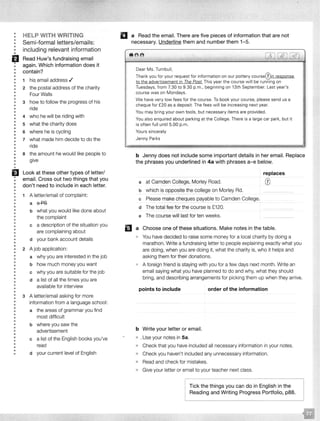
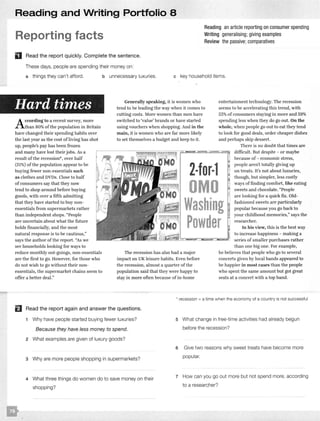
![•••
•
•
EJ•
•
••
•
••
•
•
•
•
•
••
•
•
••
•
••
•
••
••
•
••
•••
HELP WITH WRITING
Generalising; giving examples
a Look at the sentences. Circle the phrases used in
the article.
1 Over half of the population are buying/appear to be
buying fewer non-essentials ...
2 the supermarket chains offer/seem to offer a better deal.
3 ... it is women who tend to be leading/are leading the
way ...
4 ... (people) look for/tend to look for good deals .. .
b Choose the correct phrase.
a The phrases seem and appear to make generalisations
sound more/less certain.
b The phrase tend to emphasises that a generalisation is
always true/not always true.
Look at the words and phrases in bold in the article.
Match them to 1-3.
• 1 phrases which generalise
••• on_tf]e whole
•
•
•
•
•• 2 words or phrases which come before examples
•
•
••
•
•
•
•
•
•
•
••
B•
•
•
•
••
•
•••
•
••
•
•
•
•
••
•
•
•
•
•
•
•
•
•
•
•
•
•
•
••
•
•
•
•
•
3 words or phrases emphasising that an opinion belongs
to a particular person or group
Change the words and phrases in bold using the
words in brackets.
1 The majority of people today shop in supermarkets.
(seem)
seem to shop
2 Fewer customers are buying organic vegetables.
(appear)
3 Old-fashioned sweets are getting increasingly popular.
(seem)
4 Small independent shops suffer when a supermarket
opens. (tend)
5 People are not spending so much. (appear)
6 Organic food is more expensive. (tends)
l!J Fill in the gaps with these words.
te tends like whole generally
such seem Apparently main
According 1_JQ_ research, the average take-home
salary 2___. to be lower than it used to be.
3 ______ speaking, though, increasing numbers of
people are choosing to spend their money on enjoying
themselves rather than buying goods. 4
'once in a lifetime' activities 5
...... parachuting
or sports car racing have become very popular. On the
6 _ , fewer people are saving money
in banks, as the rate of interest is very low. In the
7_ _ _ , too, people 8_____ to be
choosing shorter holidays 9 as weekend
city breaks rather than the traditional two weeks in
the summer.
fl a Choose one of these ideas. Make notes in the
table.
o Write a report for your local newspaper on how public
transport facilities in your area could be improved.
• Write a report for your local council saying how
shopping, eating or leisure facilities in your town could
be improved for the majority of residents.
• Write a report for a college magazine saying what
most people of your age group choose to spend their
money on.
what the problem is
how you did your research
what you suggest doing
possible results
b Write your report.
• Use your notes in 7a.
Use phrases in 3 and 4 to make generalisations and
to make statements less certain where appropriate.
Read and check for mistakes.
Give your report to your teacher next class.
Tick the things you can do in English lReading and Writing Progress](https://image.slidesharecdn.com/f2f-iiupper-intworkbookwithkey-171201113951/85/workbook_with_key-80-320.jpg)
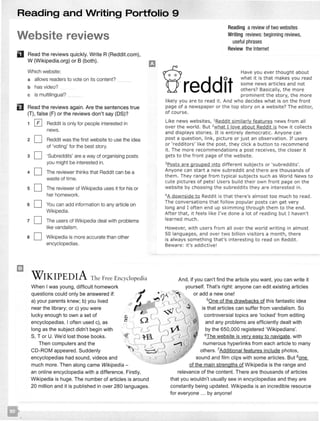
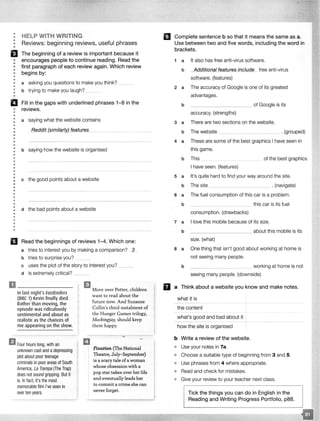
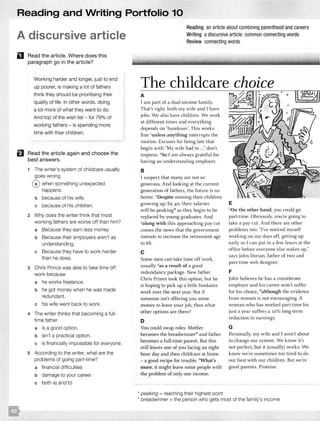
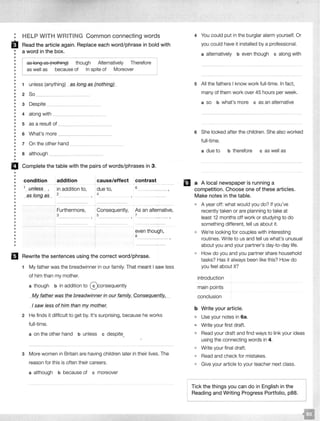
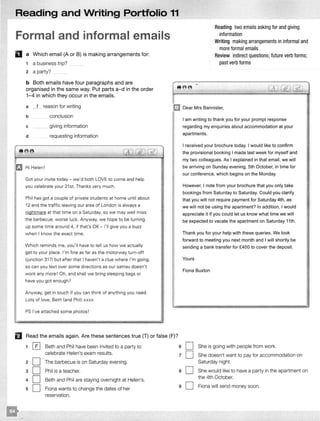
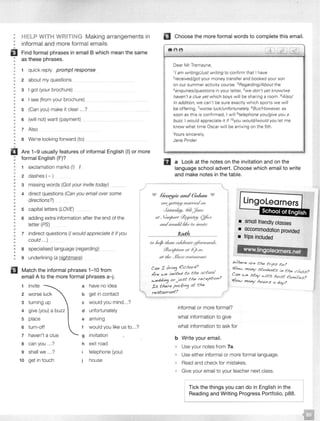
![Reading and Writing Portfolio 12
A personal email
D Read the email quickly. Is the main purpose to tell Ellie:
a to do something?
b about the wedding?
c about a tour she went on?
Reading a personal email about aghostly
experience
Writing a personal email about an experience:
common mistakes
Review past verb forms;reported speech
El Read the email again. Are these sentences true (T), false (F) or the email doesn't say (DS)?
1 [£] Sarah and Robin went to Edinburgh to go on a 6 D Members of the company were employed to
ghost walk. scare people.
2 D Sarah didn't think the beginning of the walk was 7 D Sarah and Robin both heard strange sounds
very interesting. in the last room.
3 D The underground vaults have a reputation for 8 D The guide took Sarah's news seriously.
being haunted. 9 D Fran had seen the cobbler on another visit.
4 D Sarah tried to take a photo of the cobbler. 10 D Sarah advised Ellie to go on the tour.
5 D There was no obvious explanation for the photo
Sarah found on her camera.
CL[)(#J(ill
Hi Ellie,
Just couldn't wait to tell you about our trip to Scotland! As you know, it was Sally and George's wedding
on the Friday and we weren't getting a train back till Sunday morning so on Saturday night we booked for
one of 1
those 'ghost walks' that Edinburgh is so famous for.
I wasn't very 2impressed by the tour at first - we just walked round the spooky bits of the city, which
was OK, I suppose, but things didn't really begin to liven up until we went down into the vaults near South
Bridge. Apparently, the BBC said it was 'possibly the most haunted place in Britain' and I can see why!
You go down a stone staircase into these dark damp rooms where families 3used to live in the 18th
century. Our guide, Fran, told stories about the place 4and said some people had seen a cobbler*
working in a corner. Robin was actually standing there, but he didn't seem to feel anything. Imagine our
shock, then, when we looked at the digital pictures 5we'd taken. Instead of Fran talking to the group we
saw the whitish outline of a man, his face quite clear, holding one hand by his ear as if he were listening.
There was no movement of air in the room and nothing on the wall, so it 6can't have been a shadow.
Anyway, we continued our tour and in the last room I 7kept looking at a particular corner. I had a feeling
that a member of the tour company would jump out and scare us. I tried to focus on Fran's ghost story and
suddenly I felt a really cold feeling through my right shoulder, up my neck and on my face, but not to my
left side, which was warm. I looked over at the corner. Nothing! In the end, I swapped places with Robin,
without saying anything to him. Almost immediately, he said he could hear footsteps and he felt like I had.
We both got the impression that the spirit was irritated and wanted us to leave. So I told the guide and she
cleared the room. Out in the corridor, the coldness disappeared.
On the street, Fran gave us more details of the spirit we had experienced and others we had not. She said
8the tour group kept records of sightings, including the cobbler and 'ours'. I know you'll be going up there
next month, so make sure you go on the tour and tell me if you see anything.
The wedding was great, by the way! The weather was fantastic and Sally looked gorgeous.
Have a good week,
Sarah
*cobbler = someone who mends shoes](https://image.slidesharecdn.com/f2f-iiupper-intworkbookwithkey-171201113951/85/workbook_with_key-87-320.jpg)
